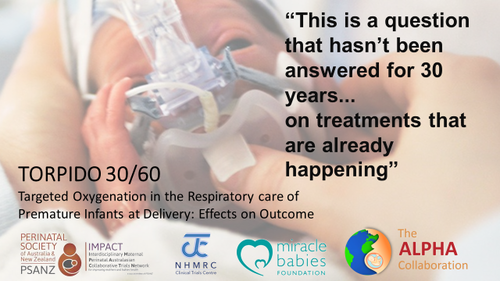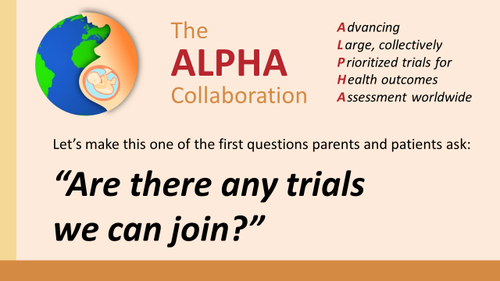For 3 years in a row, a neonatal trial has won an award at the Australian Clinical Trials Alliance (ACTA) Annual Trial of the Year Awards!
Every year, 20 May is International Clinical Trials Day and as part of the celebrations ACTA held its fourth annual Awards celebration, this year at the Royal Children’s Hospital in Melbourne. For the first time, a new award was added to the list – the Consumer Involvement Award.
This was established to recognise and celebrate the outstanding achievements of ACTA members who advance clinical practice and save or improve the lives of patients every year through consumer involvement, above and beyond participation, in investigator-driven clinical trials.
It was such an honour for me to be in the room to accept the inaugural Consumer Involvement award for the TORPIDO 30/60 Trial, a trial which aims to determine which initial concentration of oxygen (30% or 60%) should be given to preterm babies in the delivery room.
Why was consumer involvement in TORPIDO 30/60 so important?
The moments before the birth of a premature baby and the minutes, hours, days and weeks after their early delivery are some of the scariest and darkest days of a parent’s life. Trust me, I know, I’ve been through it 3 times.
This is also usually the time that parents may be approached to enrol their baby in a clinical trial and I can tell you, not knowing what I now know, had we been approached at the time, we probably would have said no.
The experiences of my sons’ early births was the catalyst for the creation of Miracle Babies Foundation nearly 15 years ago and in that time I have since learnt the vital importance of clinical trials and I am now so grateful to the parents before me who did say yes to taking part in trials and helped shape my sons’ care.
To my astonishment, I’ve also learnt that it sometimes takes years to recruit enough babies into a clinical trial to make it scientifically valid – even if the trial asks a question as simple as “Should preterm babies breathe high or low concentrations of oxygen straight after birth?”
Even worse, some trials, like the original 2014 TORPIDO trial, are abandoned because too few babies are recruited, even though the answer might save thousands of preterm babies worldwide.
Gaining parents’ permission for a delivery room trial before or at birth is often not possible nor is it always appropriate. Instead a research team might need to get hundreds of signatures from parents in early pregnancy for each baby who is actually born preterm and is eligible. This is not feasible either.
Last year, I was asked to partner with the TORPIDO research team, co-chaired by Professor Ju Lee Oei of the University of New South Wales and Professor William Tarnow-Mordi, University of Sydney and supported by Dr Javeed Travadi and Professor Ian Wright, University of Newcastle, NSW. We approached and presented to the Hunter New England Research Ethics Committee. Together, we followed the National Health and Medical Research Council (NHMRC) guidelines on waiver of consent for research that we felt could not be done any other way.*
When I spoke to other mothers within our organisation, it truly seemed to be a no-brainer.
The two concentrations of oxygen being compared in the new TORPIDO 30/60 trial are already within current recommended practice, so they pose no risk compared with usual care. How can they if they are part of the spectrum of usual care?

And yet, this question of which starting concentration of oxygen is better, is a question that hasn’t been answered for 30 years, on treatments that are already happening. How scary for a parent to know this? How can we not get the answer?
The Hunter New England Ethics Committee listened to me as I presented the consumer voice on behalf of the TORPIDO 30/60 research team and unanimously agreed to our proposal for waiver of consent. This means that all eligible babies can now benefit by entering the study, including those born at night, on weekends, or in emergencies – who would have otherwise been missed.
It’s a huge win for improving quality of care and a huge win for families.
Working with consumers in this way means looking for ways to collaborate in trials from the very beginning and not just at the end when needing to gain consent.
Professor William Tarnow-Mordi comments “There is now clear evidence that, on average, taking part in a Phase III trial (i.e. large trials that test treatments which have already been through smaller Phase II trials) is associated with higher survival and better outcomes than having established care outside the Phase III trial. The evidence for this is summarised in an article in Nature in 2013.**
We will make sure that notices about the trial are displayed in antenatal clinics and neonatal units and that neonatal staff explain the trial to parents after babies are admitted for neonatal care. Also, we will seek parents’ permission for the use of secondary data and for childhood follow up.”
I thank ACTA on the creation of this award. It is an important step forward and this is an incredible acknowledgement of the impact of Miracle Babies Foundation and the parent voice. I look forward to a continued partnership between Miracle Babies Foundation and researchers in collaboration because I get to see firsthand the impact it is making.
It’s not lip service.
It’s not token.
It is true collaboration.
And I would like to see more community awareness on the importance of trials so that two things can happen:
1. Research is completely embedded into clinical practice – as advocated by the ALPHA Collaboration*** and
2. One of the first questions patients will ask their doctor or nurse is ‘Are there any trials I can join?’

Official Press Release: http://www.clinicaltrialsalliance.org.au/latest-news/trial-of-the-year-awards
Originally published at: www.melindacruz.com
References:
* National Health and Medical Research Council, Australian Research Council, Australian Vice-Chancellors’ Committee. National Statement on Ethical Conduct in Human Research. Canberra 2007. (Updated May 2015). Canberra.
** Djulbegovic B, Kumar A, Glasziou P, Miladinovic B, Chalmers I. Medical research: Trial unpredictability yields predictable therapy gains. Nature 2013;500:395-6.
*** NHMRC Clinical Trials Centre, University of Sydney. Saving millions more lives through megatrials; Introducing the ALPHA Collaboration. https://www.youtube.com/watch?v=oy3J6iZzOfE accessed 5 July 2018.


